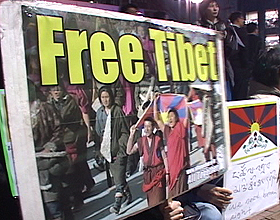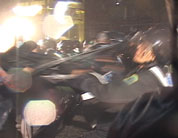all text articles
Home > list > international
Brokers of migrant workers in Taiwan protest to secure profits
Coolloud http://www.coolloud.org.tw
On Jan 28, protesters gathered round the CLA (Council of Labor Affairs); instead of angry unemployed laborers, they were brokers who have made bucks by "importing" migrant labors into Taiwan, protesting for their tarnished business by the "direct employment" policy implemented by the CLA.
"Direct employment" is a policy that labor NGOs have demanded for years. Taiwan has been using migrant workers for 18 years, for as long its society somehow has held discrimination against them, regarding them as highly replaceable workforces. Foreign labor policy is one of the major exploiters of the migrant workers.
Wu Jing-Ru (吳靜如), Secretary General of TIWA (Taiwan International Workers Association,台灣國際勞工協會) pointed out five major problems in Taiwan's foreign labor policy, including the limit imposed on working duration, the broker system, the inapplicability of Labor Standards Law (勞基法) on migrant workers, deprivation of rights to form labor unions and choose their employers. Wu said the discriminating policies have justified the exploitation of migrant workers, and the NGOs have
to unite and ask for changes in the policy.
In 2005, migrant workers for Kaohsiung's MRT system rioted against slavery, which case exposed the inadequacy of migrant labor policies. However, the case only resulted in political quarrels, bringing hardly any change on policies.
Brokers, of course, become the beneficiaries. Before 2001, the commission of introducing migrant workers depended solely on demand and supply, when brokers knew how desperate southeastern Asians were to go to richer countries to make a living, therefore demanding a sky-high commission. In most cases, during the three years the migrant worker is allowed to stay in Taiwan, they spent their first two years working to pay off the commission. Because the workers in debt have no
freedom to choose their employers, they either put up with unfair treatment, or become "runaway workers," who often take the blame for rising criminal activities.
On November 9, 2001, under the pressure of labor NGOs, the CLA finally announced a regulation, prohibiting the brokers from getting "commission;" instead, they can only ask for "service charges," which is no more than $1800 NT per month during the first year, $1700 per month during the second year, and $1500 during the third.
However, Taiwanese brokers have teamed up with brokers in the workers' home countries, cheating the migrant labors into signing an enormous loan contract, so the brokers on both sides can share the commission in the dark.
Though the CLA knows about it, there is nothing they can do. For one thing, the broker system enables the officials and employers to easily manage and control the workers. The government wants to get cheap labor on one hand, but doesn't want the migrant labors to establish their own job seeking networks on the other hand. For another thing, the brokers are connected to huge amount of interests, like the broker company for Kaohsiung MRT who hooked up with the secretary of presidential office.
Through years of fighting, the CLA finally got their hands on the ''direct employment'' policy suggested by the labor NGOs. Currently it is applicable only on employers who have already hired household helpers and have demand for re-employment after a three-year contract, and the CLA has said the policy would be extended to first-time migrant workers and factory workers later only if the first stage goes well. However, since the brokers' interests have been tarnished, they gathered on Jan 28, 2008 to protest by the CLA.
Mr. Ou, former chairperson of Taipei Employment Service Institute Association (台北市就業服務公會) said the protest of the brokers was not targeted toward the direct employment policy, because all the other countries are adopting both broker system and direct employment.
According to Ou, the brokers are angered because the procedures required in direct employment are much simpler than the brokers, who are asked to provide more documents. The brokers are protesting against the government's intention to take profits away from the people who make a living as brokers.
But, Wu Jing-Ru thinks that service offered by the government should of course be better. What's more, the employment procedures of blue-collar labors are still much more complicated than those of white-collar ones, which Wu considers to be class discrimination.
Meanwhile, this is why brokers manage to find profits from the complexity of the procedures.
That is to say, though the employment of some of the migrant workers have been made easier, the brokers can still play around with the regulations; some of them are already trying to convince the employers that direct employment still incorporates many procedures, which they can help simplify with extra charges, and the migrant workers will still be the victims.
Wu also thinks that, apart from the realization of direct employment, there are still many things the CLA should do. Not until the CLA examines its migrant worker policies as a whole regardless of pressure from the brokers, the situation of labors will never be better off.
"Direct employment" is a policy that labor NGOs have demanded for years. Taiwan has been using migrant workers for 18 years, for as long its society somehow has held discrimination against them, regarding them as highly replaceable workforces. Foreign labor policy is one of the major exploiters of the migrant workers.
Wu Jing-Ru (吳靜如), Secretary General of TIWA (Taiwan International Workers Association,台灣國際勞工協會) pointed out five major problems in Taiwan's foreign labor policy, including the limit imposed on working duration, the broker system, the inapplicability of Labor Standards Law (勞基法) on migrant workers, deprivation of rights to form labor unions and choose their employers. Wu said the discriminating policies have justified the exploitation of migrant workers, and the NGOs have
to unite and ask for changes in the policy.
In 2005, migrant workers for Kaohsiung's MRT system rioted against slavery, which case exposed the inadequacy of migrant labor policies. However, the case only resulted in political quarrels, bringing hardly any change on policies.
Brokers, of course, become the beneficiaries. Before 2001, the commission of introducing migrant workers depended solely on demand and supply, when brokers knew how desperate southeastern Asians were to go to richer countries to make a living, therefore demanding a sky-high commission. In most cases, during the three years the migrant worker is allowed to stay in Taiwan, they spent their first two years working to pay off the commission. Because the workers in debt have no
freedom to choose their employers, they either put up with unfair treatment, or become "runaway workers," who often take the blame for rising criminal activities.
On November 9, 2001, under the pressure of labor NGOs, the CLA finally announced a regulation, prohibiting the brokers from getting "commission;" instead, they can only ask for "service charges," which is no more than $1800 NT per month during the first year, $1700 per month during the second year, and $1500 during the third.
However, Taiwanese brokers have teamed up with brokers in the workers' home countries, cheating the migrant labors into signing an enormous loan contract, so the brokers on both sides can share the commission in the dark.
Though the CLA knows about it, there is nothing they can do. For one thing, the broker system enables the officials and employers to easily manage and control the workers. The government wants to get cheap labor on one hand, but doesn't want the migrant labors to establish their own job seeking networks on the other hand. For another thing, the brokers are connected to huge amount of interests, like the broker company for Kaohsiung MRT who hooked up with the secretary of presidential office.
Through years of fighting, the CLA finally got their hands on the ''direct employment'' policy suggested by the labor NGOs. Currently it is applicable only on employers who have already hired household helpers and have demand for re-employment after a three-year contract, and the CLA has said the policy would be extended to first-time migrant workers and factory workers later only if the first stage goes well. However, since the brokers' interests have been tarnished, they gathered on Jan 28, 2008 to protest by the CLA.
Mr. Ou, former chairperson of Taipei Employment Service Institute Association (台北市就業服務公會) said the protest of the brokers was not targeted toward the direct employment policy, because all the other countries are adopting both broker system and direct employment.
According to Ou, the brokers are angered because the procedures required in direct employment are much simpler than the brokers, who are asked to provide more documents. The brokers are protesting against the government's intention to take profits away from the people who make a living as brokers.
But, Wu Jing-Ru thinks that service offered by the government should of course be better. What's more, the employment procedures of blue-collar labors are still much more complicated than those of white-collar ones, which Wu considers to be class discrimination.
Meanwhile, this is why brokers manage to find profits from the complexity of the procedures.
That is to say, though the employment of some of the migrant workers have been made easier, the brokers can still play around with the regulations; some of them are already trying to convince the employers that direct employment still incorporates many procedures, which they can help simplify with extra charges, and the migrant workers will still be the victims.
Wu also thinks that, apart from the realization of direct employment, there are still many things the CLA should do. Not until the CLA examines its migrant worker policies as a whole regardless of pressure from the brokers, the situation of labors will never be better off.
Real editing time : March 10, 2008
Registration : March 10, 2008
Registration : March 10, 2008
trackback URL http://www.newscham.net/news/trackback.php?board=news_E&nid=46744 [copyinClipboard]


